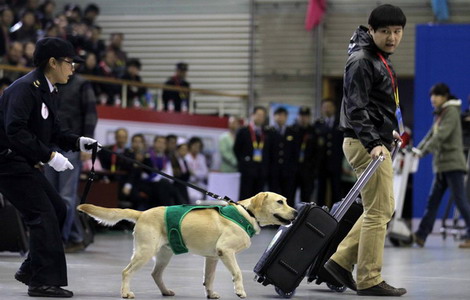Illegal land use gives year-end GDP boost
Updated: 2011-10-26 08:19
By Wang Qian (China Daily)
|
|||||||||||
BEIJING - With only three months left in the year to drive up GDP, China's local governments may gobble up land for economic development, posing a severe challenge in protecting the country's shrinking arable land, an official warned on Tuesday.
Illegal land use may become rampant in the last quarter of the year as land supply cannot meet the fast-growing need, Wang Ling, deputy director of the law enforcement and supervision administration under the Ministry of Land and Resources, said at a news conference in Beijing.
The country's central and western parts have seen the worst offenders, where local governments are drumming up economic development to close the gap with the prosperous eastern coast.
Latest statistics released by the ministry show that from January to September, more than 80 percent of the country's illegal land use cases occurred in the central and western parts of the country.
Some local governments are illegally permitting projects like golf courses, railways and industrial parks to attract investment, Wang said.
From September 2009 to September 2010, Qingtongxia city government in Ningxia, Northwest China, illegally sold 185 hectares of land to 28 enterprises for industrial and residential use. Zhang Xinmin, director of the Qingtongxia land and resources bureau, was dismissed in the case.
In May 2010, Huashan district government in Ma'anshan city, Anhui province, East China, illegally grabbed 28 hectares of land - which was collectively owned by a local community - to build Xiushanhu Park. All the land was returned to the original owners on Sept 8 and a fine of nearly 2.3 million yuan ($354,000) was given to the construction headquarters of the park.
The number of cases of illegal land use have climbed this year, involving 16,400 hectares of land in the first nine months, about 11 percent more than the same period last year, Wang said.
Land experts blamed the regional governments' increasing reliance on construction projects as the major means to guarantee the prosperity of their local economies.
Yan Jinming, a land management professor at Renmin University of China, said that during the opening year of the 12th Five-Year Plan (2011-2015) local governments want to hand in a decent report, which usually relies heavily on land transfer fee.
Without enough land trading, yearly GDP growth will look bad, he added.
Even when GDP looks good, senior officials whose precincts are found with serious illegal land-use problems will be reprimanded by the Ministry of Land and Resources if more than 15 percent of newly developed land in these areas is illegally used.
According to a survey by the ministry early this year, regional governments around the country plan to set aside more than 1 million hectares of land for building roads, railways and similar projects in 2011, much more than the 448,900 hectares the State Council said to put to such use.
Hot Topics
New sex education textbooks were introduced to pupils in Shanghai on Monday after numerous debates on early-age sex education in China.
Editor's Picks

|

|

|

|

|

|







